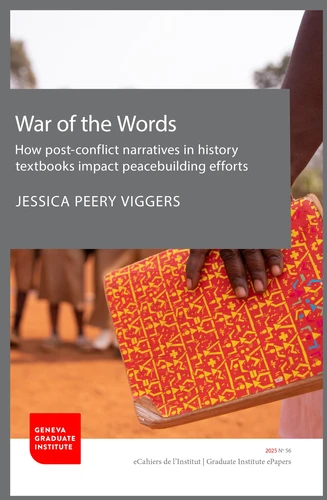War of the Words. How post-conflict narratives in history textbooks impact peacebuilding efforts
Par :Formats :
Disponible dans votre compte client Decitre ou Furet du Nord dès validation de votre commande. Le format Multi-format est :
- Pour les liseuses autres que Vivlio, vous devez utiliser le logiciel Adobe Digital Edition. Non compatible avec la lecture sur les liseuses Kindle, Remarkable et Sony
 , qui est-ce ?
, qui est-ce ?Notre partenaire de plateforme de lecture numérique où vous retrouverez l'ensemble de vos ebooks gratuitement
Pour en savoir plus sur nos ebooks, consultez notre aide en ligne ici
- FormatMulti-format
- ISBN978-2-940600-60-1
- EAN9782940600601
- Date de parution12/02/2025
- Protection num.NC
- Infos supplémentairesMulti-format incluant PDF avec W...
- ÉditeurGraduate Institute Publications
Résumé
This study focuses on the way societies influence historical memory of conflict within their borders through the formal education system. It posits that the narratives constructed within educational materials have the capacity to affect peacebuilding efforts in both positive and negative ways. Using the case study of Rwanda, it analyses the narratives found in the most recent collection of secondary school history textbooks to identify elements of the narrative that either support peacebuilding efforts or detract from them.
This case study shows that the same narrative or set of narratives about a conflict can contain both elements. It posits that as decision makers balance needs for what educational materials should achieve, including requirements that may limit the efficacy of peacebuilding efforts, international advisors should be knowledgeable of and sensitive to these needs in order to identify solutions that minimise negative impacts on reconciliation.
This case study shows that the same narrative or set of narratives about a conflict can contain both elements. It posits that as decision makers balance needs for what educational materials should achieve, including requirements that may limit the efficacy of peacebuilding efforts, international advisors should be knowledgeable of and sensitive to these needs in order to identify solutions that minimise negative impacts on reconciliation.
This study focuses on the way societies influence historical memory of conflict within their borders through the formal education system. It posits that the narratives constructed within educational materials have the capacity to affect peacebuilding efforts in both positive and negative ways. Using the case study of Rwanda, it analyses the narratives found in the most recent collection of secondary school history textbooks to identify elements of the narrative that either support peacebuilding efforts or detract from them.
This case study shows that the same narrative or set of narratives about a conflict can contain both elements. It posits that as decision makers balance needs for what educational materials should achieve, including requirements that may limit the efficacy of peacebuilding efforts, international advisors should be knowledgeable of and sensitive to these needs in order to identify solutions that minimise negative impacts on reconciliation.
This case study shows that the same narrative or set of narratives about a conflict can contain both elements. It posits that as decision makers balance needs for what educational materials should achieve, including requirements that may limit the efficacy of peacebuilding efforts, international advisors should be knowledgeable of and sensitive to these needs in order to identify solutions that minimise negative impacts on reconciliation.



